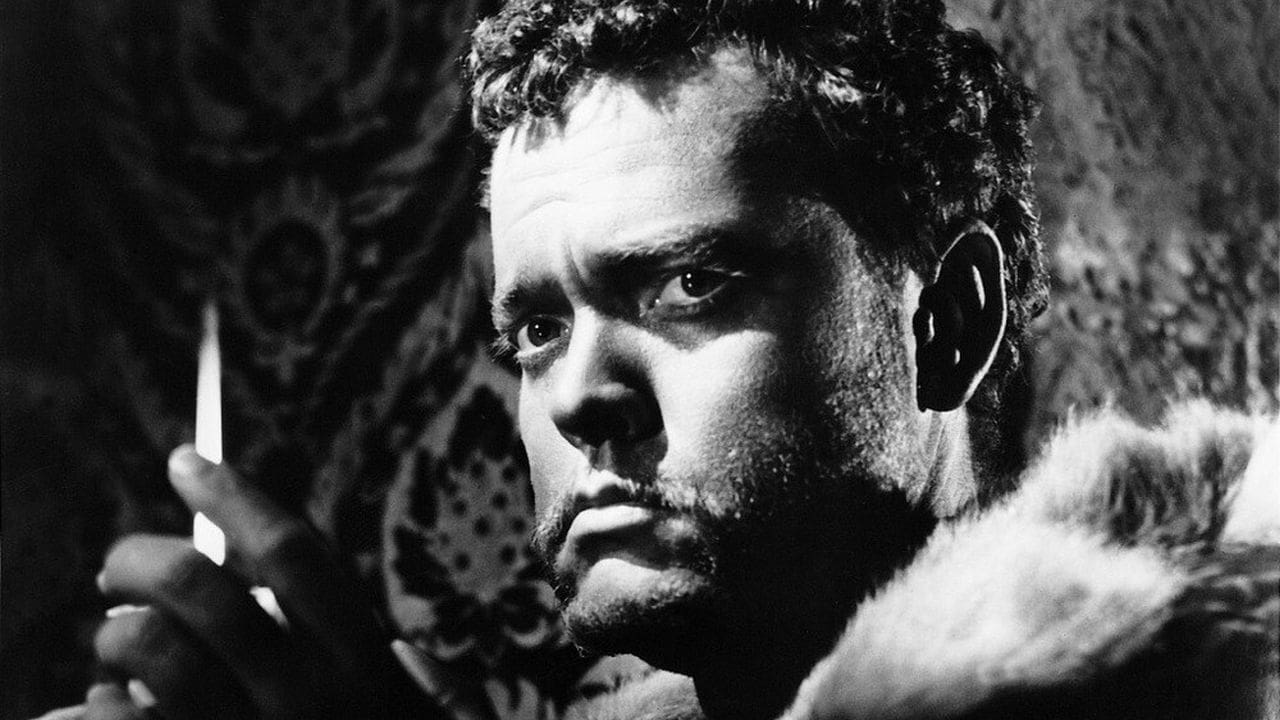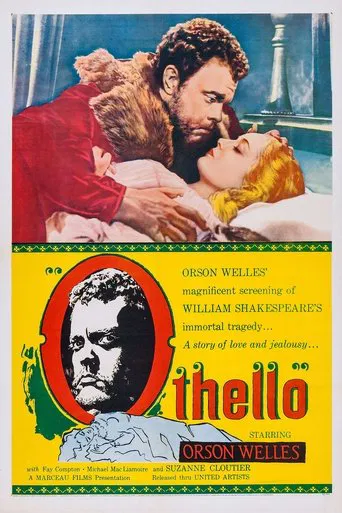

Strong and Moving!
... View MoreLack of good storyline.
... View MoreExcellent, a Must See
... View MoreGood films always raise compelling questions, whether the format is fiction or documentary fact.
... View MoreOrson Welles made Otello one excellent movie, because he knows everything about teatro and movies. All actors has good performances. Orson Welles, Micheál MacLiammói had great work. The movie has beautiful image in black and white. This movie is to watch with pleasure.
... View More***User reviewer Abhijoy Gandhi ("Welles' indomitable spirit in the face of penury shines in yet another Wellesian Masterpiece", Abhijoy Gandhi from Philadelphia, USA, 10 January 2004) has a nice summary and good background info. Also, Jonathon Dabell ("Excellent version of the great Shakespearean tragedy, distinguished by fine camera work and powerful performances", Jonathon Dabell (barnaby.rudge@hotmail.co.uk) from Todmorden, England, 17 January 2007) also has a nice summary. Finally, EddieK discusses ("Welles' images match the beauty of Shakespeare's language", EddieK from United States, 3 January 2006) the controversies associated with the restoration.***"Othello" (1952, Orson Welles) is an enjoyable trip back in time. The difficulty that Orson Welles had making it is another piece of his legend. It is low-budget and was filmed over three years. Welles took several breaks to act elsewhere in order to raise more money for the financially-starved project. When period costumes don't arrive in time he famously improvises scenes in a Turkish bath. When his actor playing Roderigo (Robert Coote) isn't available for post-production dubbing, Welles (capably) dubs the other man's voice himself.The result is very entertaining, clearly one of the greatest adaptations of William Shakespeare so far. There are many reasons to admire it. The most obvious is how it looks. The starkness of so many exteriors and the oppression that is felt with the palatial interiors is vintage Welles. Then there are the relatively quick jumps and fragments of Shakespearean dialog that are always spoken by quickly (without regard for whether a contemporary audience can decipher it in time before the next line). All of these details contribute to the sense that the viewer has been transported back to the Middle Ages.Welles in (very inconsistent) black makeup plays Othello the general, another leader in Shakespeare's canon who loses his sanity. Welles' familiar, rich baritone, so unique and pleasant to the ears, lends much gravity to the unwell Moor. (BTW, there is a funny moment when we see the back of Welles' neck and can see the makeup line between his artificially dark complexion and his natural skin color--woops.)The rest of the cast hangs with Welles. Suzanne Cloutier is a very beautiful and tragic Desdemona that serves to make Othello seem crazy in comparison. Some Shakespeare purists may object to Robert Coote's somewhat dim Roderigo, but the actor seems to be living the role. Doris Dowling, who must have been one of the prettiest actresses of that era, has a minor role as a GF/prostitute of Cassio (Michael Laurence. Also, Joseph Cotton apparently appears, but I missed him.) However, the essential figure in the cast is Micheál MacLiammóir as Iago. This Iago is depicted as a wretched, diminutive fellow incapable of charm. This interpretation of Iago may be controversial, as his treachery is always very obvious. However, along with Welles's Hellish direction MacLiammóir's grave delivery fits perfectly (making The Middle Ages seem a more difficult era to endure than the post-911 present).Desdemona's fate not withstanding, watching Iago manipulate Othello into the latter's downfall is fun. The little guy is quite the nasty bastard. The great Orson Welles is sorely missed today.
... View MoreI don't know if Orson Welles' Othello will be the best adaptation of Othello - from what little I could bare to watch it's certainly superior than the turgid and offensive Laurence Olivier version, though perhaps not quite as well acted as the Branuagh - but it would be hard pressed to see another that was as great a *film* as this is. This is not simply a case of 'well, he did the best that he could work with'. While there is an element of this, as it is true that Welles made a real "indie" movie by financing the project himself over three years and had to make do with getting the footage he could and the actors he could (one of which wasn't there for the dubbing, Rodrigo), it is on its own terms a revolutionary form of Shakespeare because it eschews the static nature of a stage. For Welles, film should be alive and move one to see the world through his eyes, and it's through this that Othello, the always haunting story of a Moor's doubt of infidelity with his wife Desdemona by the prodding of Iago, is important.This isn't to say that it's always the easiest to hear (some of the dubbing is lacking in timing), and some of the acting from time to time isn't perfect. Yet its strengths are that of giving us a new way to look at Othello, and at film in general. Sometimes one looks at Shakespeare and it's hard to see it going at a pace that doesn't restrict certain movements of the camera. But Welles' Othello is first, before Shakespeare, an Orson Welles movie. And perhaps more than even The Trial one sees the director crafting this baroque world set in castles of Morocco and Italy with a claustrophobic, maybe even film-noir, sensibility. The eye on these characters is both stark and stilted, as if the high-and-tense emotions of the characters stretch out into the medium itself, like a nightmare inevitably unfolding. And the quick cuts make it move like a post-modern movie; I can't help but think that great films (Breathless, especially in cutting-down an original draft) and not-so great ones (Romeo + Juliet) took heavy influence from this.Knowing the story helps a little, but it's not entirely necessary. Welles delivers his Othello as a figure beguiled by his love, and disillusioned he's often seen in tight close-ups or turned away, ready to explode or perhaps burst into tears at any moment. It's intense work from Welles as an actor, and some of the others like the ones playing Iago and Emilia do deliver all that they can. But while some scenes have been cut, or sometimes whole sub-plots, they don't affect the cores of the characters, and the themes are not hurt by the cuts Welles made to the text. If anything this compacted version is like getting the greatest Cliff-Notes ever, and seen through a filmmaker's eyes that makes us rethink (or just re-asses) how we see this tragedy of Othello through this medium. Does tragedy and consequence, and the horror of a mind scathed by jealousy (or, for that matter, the evil intent of a malicious mind-twister like Iago) gain depth filmed like this? I would think so, by leaps and bounds. If anything, and hopefully this can be a compliment, the film might be a non-silent silent film of Shakespeare, on that level the most profound, as we see a story and conflict unfold all through visuals. Just as one example, watch the scene where Othello is told by Iago firm proof of Desdemona's trysting with Casius (the "With her, on top of her" bit), and then as Othello faints and how the camera spins out of control, seeing the buildings wobble, the world turned upside down, birds flying perpexingly in the air, and people also flipped around contemplating this man Othello, eyes wide open but fixed-frozen like a scarred statue. It's things like this that give Welles' Othello its uniqueness: if you turn on the sound of the voices (sometimes dubbed odd and not totally in sync) one can appreciate the ragged, awesome poetry of one artist channeling another.
... View MoreI first saw the movie in junior college in a special screening my film instructor gave. He showed a rather dark black and white 16mm print. Even in that dark form I could see it was one of the most beautiful b&w films ever shot. It has since been restored, the picture now bright and beautiful. It's worth seeing for the photography alone, but it has so much more. If you're reading this you may know at least something about the history of this film, but in a nutshell it was made across 4 years, from 1949 to 1952, because Welles financed the film himself and whenever he ran out of money he would go act in other films to raise the money to reassemble the cast and continue. Some conversations would have one character talking with the reverse shot of the other actor being shot three years later! You never notice it! It's just a stunning achievement considering the difficulty he had in making the film that it even got finished let alone be as excellent a film as it is. If you've never seen filmed Shakespeare, this is a great place to start. I'm sure purists would complain since the text is quite edited, but Welles uses his own narration in fairly modern English to make the story easy to follow. As Othello, Welles is believable, regal and in the end, chilling and sad. He brings the man to life. The rest of the cast is outstanding, including Micheal MacLiammoir as a cunning and wicked Iago, and Canadian actress Suzanne Cloutier, giving an absolutely heart wrenching performance as Desdemona. The deathbed murder scene between Welles and Cloutier has powerful emotional impact. I believe this version of the story outshines the 1996 adaptation with Laurence Fishburne and Irene Jacobs, even though the newer film sticks closer to Shakespeare's text. Kenneth Brannagh was a good Iago, and the film has a wonderful score by CHarlie Mole, but Welles version is better paced and it hit me more emotionally.This restoration of Welles' Othello was a labor of love for the people that had to track down the film elements and try and reconstruct what Welles originally intended. Unlike Welles' "Touch of Evil," which was re-edited by the studio and compromised in the process, Welles' owned "Othello" so the version that got released was his. Unfortunately, he was severely let down by the sound department. The original track was muddy, some voices had sync problems, and the music was badly recorded. The restoration crew cut out the dialog line by line, re-cut it to match the mouth movements, redid the Foley and all sound effects, and rerecorded Francesco Lavagnino's bold score in the exact tempo of the original recording. The final result is pretty amazing. And though this is not really the definitive version since Welles is no longer here, it's probably as close as we'll ever get to what the film could have been, if Welles had more money and time. Even so, back in 1952 it won the Palm d'Or at Cannes in its original form. Orson Welles' "Tragedy of Othello" is beautifully filmed Shakespeare with a strong cast. I believe it lives up to its reputation as one of Welles' finest efforts. For fans of Welles and Shakespeare, you'll probably find much to appreciate.
... View More